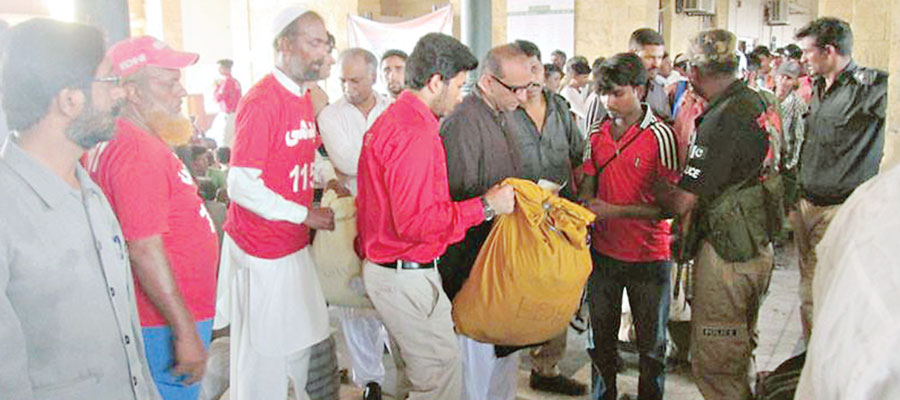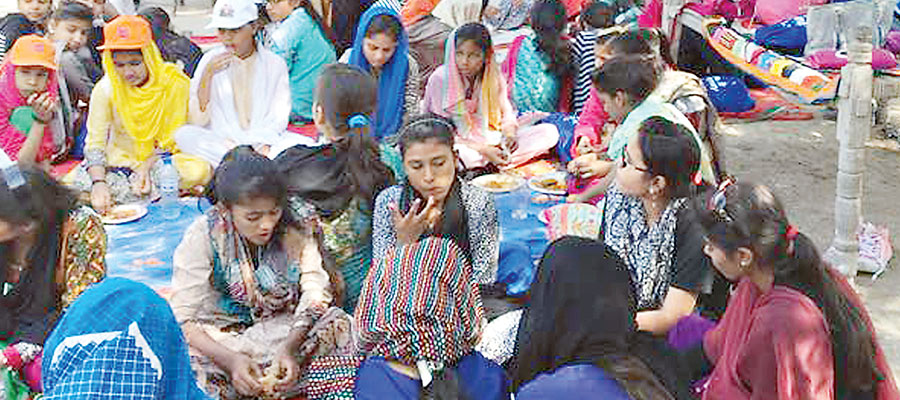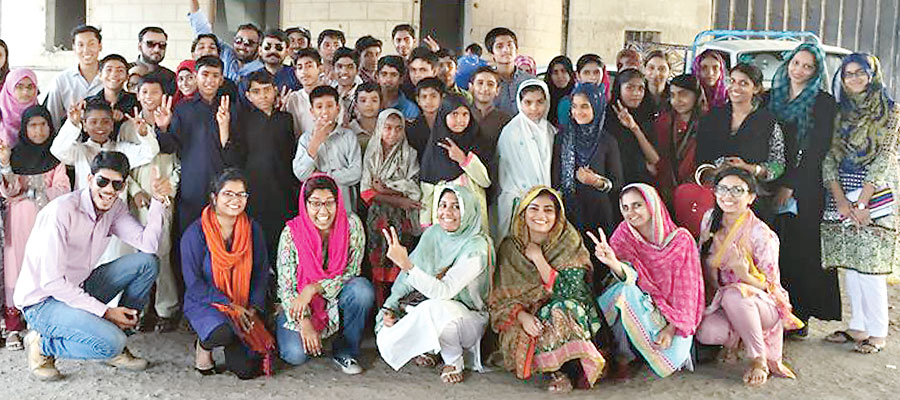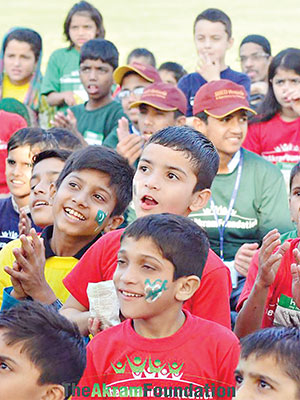DUNKI: THE PERILOUS PATH TO EUROPE
- 30 Mar - 05 Apr, 2024

The sun peeks from the horizon, soon lighting up the haze like a furnace. As the ball of fire has its clock in motion, the dwellers of the Land of the Pure have their alarms blaring from the corners of shanty slums to upscale neighbourhoods; some either leave them on snooze, for the chilled rooms and a night well spent out in a shopping spree is routine for a clique of men and women, but in most other cases, many have spent the night fanning themselves either due to outage of power, and the soaring temperatures having put the denizens at discomfort, while in other instances either of the family member is suffering from an ailment.
According to Pakistan’s first ever report on multidimensional poverty, issued by the Ministry of Planning, Development and Reform, 39 per cent of the citizens live in multidimensional poverty. The Oxford Poverty and Human Development Initiative (OPHI) helps us understand what this dimension to poverty is: “Multidimensional poverty is made up of several factors that constitute poor people’s experience of deprivation – such as poor health, lack of education, inadequate living standard, lack of income (as one of several factors considered), disempowerment, poor quality of work and threat from violence.”
To counter the grave realities on the ground, which according to the abovementioned report issued in 2016, four out of 10 Pakistanis live in multidimensional poverty, there are multiple not-for-profits which are steering the wheel of change to help the society evolve into a stable, developing one, and trying to ensure the basic needs are fulfilled which include better education, improved sanitation and living standards and empowering the destitute. For this purpose, MAG got in touch with a few organisations that have been serving the populace relentlessly over the years.
When it comes to an organised social welfare system in the country, Edhi Foundation is the name that has been the home for hundreds of homeless and orphans. Faisal Edhi, the son of late Abdul Sattar Edhi, points out the organisation’s efforts to ‘include every individual they serve, making them a part of a respectable community’. When in conversation with him, MAG asked if any special additions are made in Ramzan to serve the needy. “Since the past 10-12 years we have been following the routine work in the holy month as well, as we have so many patients to look after every year, so the money is used in their treatment,” says Edhi. However, this year about ‘2,000 to 2,500 individuals were served iftar in different centres of theirs which are spread across the city’, states Anwar Kazmi, the spokesperson of Edhi Foundation. “Be it langar, iftar or dinner, about 600 to 700 individuals near the Merewether Tower were served on a daily basis during Ramzan, and I am sharing the numbers of only one centre of ours” Kazmi reveals. As for celebrating the festive occasion of Eid, the selfless souls do not forget to include all those they cater to and make the merriment tenfold. “Bilquis Edhi and Faisal have an Eid festival organised at different Edhi centres where they celebrate it with the orphans, mentally disabled and homeless kids, of which we have about 4,000,” he shares.

Shabina Mustafa, founder of The Garage School in Karachi, has been catering to the community’s needs ever since November 1999. “We have classes from 8am to 8pm for people of all ages. The morning session is in English and the evening has an attendance comprising of students of odd ages. Currently, there are 300 families from Shah Rasool Colony and Neelum Colony from where the kids come to attend classes,” shares Mustafa who wants to upgrade the lifestyle of the members of the locality. “Recently we inaugurated the water filter plant that can serve these families as the water these kids get to drink is so dirty that most of the time they suffer from various waterborne diseases." Mustafa, also has a class from 7pm to 8pm for boys who work in garages. “I want each boy to be able to read manuals while they work at the mechanic’s,” she remarks. And over the years the lady has been rewarded by her top achievers. “One of the pass-outs has gone to attend College of Business Management, while another to SZABIST completing his masters with a 3.9 GPA,” Mustafa gleefully says.

On the social welfare scenario, another institute is The Akram Foundation (TAF), which is assisting several individuals to survive through ‘hunger, sickness, illiteracy, abuse and rejection’ for almost a decade. Promoting individuality in the society is the aim of this non-profit foundation. Arsalan Shah, TAF’s Manager and Treasurer, shares a couple of project’s which have been ongoing, such as the helmet drive, a part of the Road Safety campaign, along with the Eid drive. “We have planned on going to government hospitals where we will be visiting the paediatric wards, bearing expenses of several children along with distributing bed sheets, toys and blankets.” Haider also speaks about the road safety campaign his organisation has initiated. “Mostly bikers do not pay heed to the importance of a helmet. In the Geo Khelo Pakistan transmission in Ramzan, a helmet was given out to every individual who won a motorbike in the show,” he adds. Having about 400 orphans under their wing, TAF also heads a water drive. “Last year Rs. 4 lac worth of water was distributed in Kalar, Mirpur Sakro and Badin. This year too our team plans on carrying out the water drive in July,” Haider reveals. But this time around the plan is slightly different. “We plan on digging wells in the suburban regions for which purpose funds are being generated, for example Foodpanda has collaborated with us and when ordering food, one can donate to this cause.”

SPREADING SMILESSPREADING SMILES
Another battalion on the social welfare front is KUMAK – an initiative started in 2008 by a group of students from the University of Karachi to take communal responsibility. Ahsan Raza Firdousi, the founding member of team Kumak tells MAG how his team believes in ‘strict social equality’. “We started a Ramzan shopping drive in 2015 when we partnered with Tauseef Memorial School located in Gulshan-e-Iqbal and took their students out for Eid shopping.” The idea all along being to let the children wallow in the fun of shopping. “We wanted these children to make their own choices while they were engrossed in the activity, just like children from financially stable backgrounds get to enjoy,” Firdousi lets it known. Another charm to the activity is intangible. “The bond that is created when a volunteer joins hands with these children and takes them to shop is priceless; their demands, bargains and decisions are fun which in turn give us an amazing feeling.” Many of you reading must be pondering if KUMAK is an abbreviation. “It was one of the founding members, Haya Fatima Iqbal, who named it so after a Persian word for battalion," Firdousi utters.
Talking about change that each one of us seeks in our society, what is missed out mostly is the change from within. Only when the internal self is ready to serve, can the wings of change be spread, and then only can road blocks be removed. Simple acts of kindness when envelop all those who need assistance can result in ripples of magnanimous transformation of societies. And it is an attribute of healthy, evolving communities alone where individuals are keen to reject the negativity and take up every step to promote the welfare and betterment of their fellow denizens.
COMMENTS